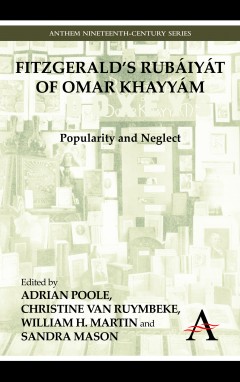FitzGerald’s Rubáiyát of Omar Khayyám
Popularity and Neglect
Edited by Adrian Poole
Christine van Ruymbeke
William H. Martin
Sandra Mason
Anthem Nineteenth-Century Series
- About This Book
- Reviews
- Author Information
- Series
- Table of Contents
- Links
- Podcasts
About This Book
This volume of essays is based on a conference held in July 2009 at Trinity College, Cambridge to celebrate the bicentenary of the birth of Edward FitzGerald (1809) and the 150th anniversary of the first publication of his ‘Rubáiyát of Omar Khayyám’ (1859). The ‘Rubáiyát’, loosely based on the verses attributed to the eleventh-century Persian writer, Omar Khayyám, has become one of the most widely known poems in the world, republished virtually every year from 1879 (the year of FitzGerald’s fourth edition) to the present day, and translated into over eighty different languages. And yet, with a few exceptions, it has been systematically ignored or at best patronized by the academic establishment. This volume sets out to explore the reasons for both the popularity and the neglect. Broadly speaking, the essays are divided into two main blocks. The first six chapters focus primarily on the poem’s literary qualities (including consideration of its place in the tradition of verse translation into English, the idea of ‘nothingness’, and ‘syntax and sexuality’), the last five on aspects of its reception (including essays on the late-Victorian Omar Khayyám Club, on American parodies, and on the many illustrated editions). They are linked by three essays that address key ‘facilitators’ in the poem’s transmission (including the significant but neglected issue of cheap reprints).
Reviews
‘[“Edward FitzGerald’s Rubáiyát of Omar Khayyám: A Famous Poem and Its Influence” and “FitzGerald’s Rubáiyát of Omar Khayyám: Popularity and Neglect”] are dual complementary works of scholarship, reflection, and academic research, in the strongest sense of the adjectives. Scholars, academics, literary critics, translators, and those who love poetry and share Khayyam’s and FitzGerald’s twofold concerns with the human lived experience of being and nonbeing will find these twin texts of much interest.’ —Erick Nakjavani, ‘Iranian Studies’
'This is the best volume now available on FitzGerald’s solicitous intelligence as translator and poet, his impleached arts of living and language, his sexual and religious ambivalences. Combining sensitive and sensible practical criticism with painstaking material and social histories of influence, it should attract further explorations of the alien vision and “new world of feeling” offered by the Rubáiyát’s conciliation of cultures.' —Dr Christopher Decker, University of Nevada, Las Vegas
'This volume explores the already fascinating story of Edward FitzGerald’s Rubáiyát, by following various new directions: textual and linguistic studies, together with socio-cultural and philosophical explorations. It also focuses on a number of factors that contributed to the poem’s continuous fame: the American publishers, the Omar Khayyám Clubs, the parodies, other translations, and of course, the art of illustrating the Rubáiyát.' —Jos Coumans, Secretary of the Netherlands Omar Khayyám Society, Editor of ‘Omariana’
'Nothing can restore Fitzgerald’s Rubaiyat to the cultural prominence of the late Victorian, early twentieth-century “Omar craze,” but this splendid bicentenary collection of essays is at least a salutary reminder of the poem’s greatness and of its immense cultural significance both as a translation and as poem in its own right. The diversity of the collection’s contributors, including poets, translators, Persian scholars and Victorianists, leads to a remarkably broad and deep understanding of FitzGerald’s achievement, and of the cultural resonance and impact of the poem over many decades.' —Professor David Riede, Ohio State University
'Despite of having done research in this field for almost thirty years now, I was surprised by the rich content of the essays in this book. They provide not only a lot of new information, but also remarkably new and stimulating points of view.' —Jos Biegstraaten, President of the Netherlands Omar Khayyám Society
Author Information
Adrian Poole is Professor of English Literature at the University of Cambridge and a Fellow of Trinity College, Cambridge. Christine van Ruymbeke is Soudavar Lecturer in Persian Studies at the University of Cambridge, and was formerly Lecturer at the Université Libre de Bruxelles (Belgium). William H. Martin and Sandra Mason are independent researchers with a long-standing interest in FitzGerald’s Rubáiyát of Omar Khayyám.
Series
Anthem Nineteenth-Century Series
Anthem Studies in Popular Culture
Anthem Middle East Studies
Table of Contents
Preface; Notes on Contributors; List of Illustrations; Introduction - Adrian Poole; 1. Edward FitzGerald, Omar Khayyám, and the Tradition of Verse Translation into English - Dick Davis 2. Much Ado about Nothing in the Rubáiyát - Daniel Karlin; 3. Common and Queer: Syntax and Sexuality in the Rubáiyát - Erik Gray; 4. A Victorian Poem: Edward FitzGerald’s Rubáiyát of Omar Khayyám - Clive Wilmer; 5. FitzGerald’s Rubáiyát and Agnosticism - Marta Simidchieva; 6. The Similar Lives and Different Destinies of Thomas Gray, Edward FitzGerald and A. E. Housman - Anthony Briggs; 7. The Second (1862 Pirate) Edition of the Rubáiyát of Omar Khayyám - John Drew; 8. Edward Heron-Allen: A Polymath’s Approach to FitzGerald’s Rubáiyát of Omar Khayyám - Garry Garrard; 9. ‘Under Omar’s subtle spell’: American Reprint Publishers and the Omar Craze - John Roger Paas; 10. The Imagined Elites of the Omar Khayyám Club - Michelle Kaiserlian; 11. Le Gallienne’s Paraphrase and the Limits of Translation - Adam Talib; 12. ‘Some for the Glories of the Sole’: The Rubáiyát and FitzGerald’s Sceptical American Parodists - Annmarie S. Drury; 13. The Vogue of English Rubáiyát and Dedicatory Poems in Honour of Khayyám and FitzGerald - Parvin Loloi; 14. The Illustration of FitzGerald’s Rubáiyát and its Contribution to Enduring Popularity - William H. Martin and Sandra Mason; Bibliography; Index
Links
Stay Updated
Information
Latest Tweets



